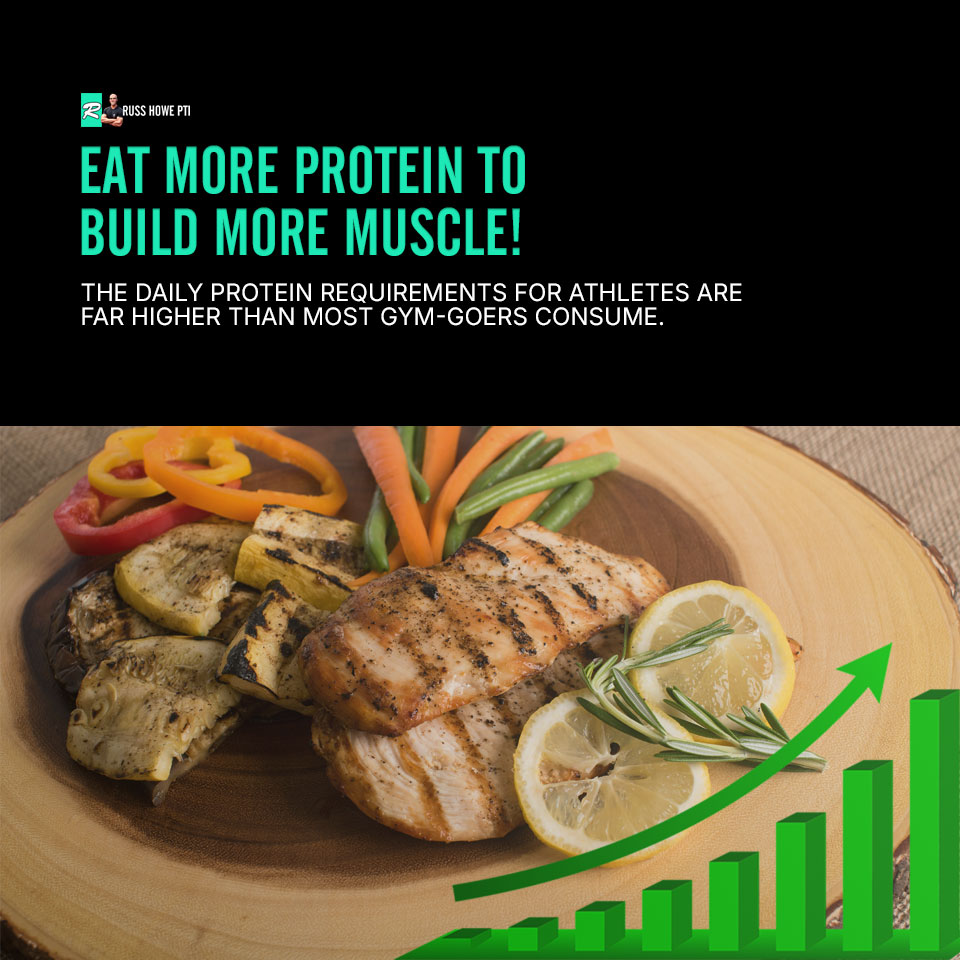Of all three macronutrients, it is protein which plays the biggest role in the muscle building process.
Unfortunately, though, not a lot of people are eating enough of the stuff to maximize their results and, as such, the nation is currently experiencing an epidemic of “T.A.S.” (tiny arms syndrome).
So in today’s article I’m going to explain why you need to make protein a nutritional priority. You’ll see exactly what it does, learn how to set your daily protein target for the best possible results, and even get a handy list of the best protein sources so that you can find foods which work for you.
Buck up, Jimbo, it’s time to build some muscle!
How Much Protein Per Day?: Video Overview
Watch video or continue reading below.

Correct Protein Requirements For Athletes
I’m not surprised that most people are confused about protein.
Current government guidelines suggest eating just 0.35 grams per pound of body weight (180lb guy = 63g/day), and even if you only have basic knoeledg of building muscle you can probably already tell me that that’s not enough! (2, 3)
So what gives?
Well, we must rememer that government guidelines are intended for “the masses”, not for people who want to lift weights and build a rockin’ body, so perhaps we’d get better advice inside a gym?
Sadly not.
The advice of most gym bros is the complete opposite to government guidelines, telling you to shovel absurd amounts of protein into your daily diet (400-500g!) until you’re literally tired of eating it. This ideology dates back to the early days of bodybuilding when not much was known about proper nutrition for athletes, and while it’s certainly better than not eating enough protein, we can definitely optimize it further.
So one of the first things I did when I became a trainer (2002) was to sift through the available body of scientific research surrounding protein consmption – specifically focusing on studies relating to muscle growth and fat loss, because that’s what most of my PT clients were interested in.
What I discovered was quite startling.
While eating more protein is definitely a good thing, it seems there’s a tipping point where results stagnate.
It’s also clear that, for most people, going above a certain threshold of protein/day can make them significantley less likely to adhere to their overall diet because it restricts food choices until they feel like they want to start headbutting motherfuckers.
If we fast-forward to 2018, a comprehensive meta-analysis confirmed that the so-called “sweet spot” for building muscle is around 1 gram per pound of body weight. (4)
This is where I tell most people to aim for because a) it’s easy to stick to and b) this particular meta-analysis arrived at it’s conclusion by comparing the results of 49 detailed studies on protein supplementation for athletes, and it falls in line the vast majority of earlier research on the topic, too. (4, 5, 6, 7, 8)
Interestingly, some of the more experimental studies which have pushed protein intake considerably higher than 1g/lb have also taught us some valuable lessons.
For instance, we now know that the muscle building capabilities of protein seem to “max out” at 1.18g/lb, so if you really want to build your diet “by the science” then this is where you should be aiming. We now also know that increasing protein to 1.5g/lb can be good for fat loss results – you won’t build any more muscle versus 1.18g/lb, but the satiating effect of protein can make a fat loss diet easier to stick to as it keeps you feeling fuller for longer. (4, 9)
With these findings in mind, a 180lb guy who wants to focus on building muscle should eat 180g-212g protein (1-1.18g/lb), and a 180lb guy who wants to focus on fat loss if he wanted to focus on fat loss he could go as high as 270g/day.
NOTE: You’ll find many so-called “experts” online who claim you should go even higher than this. It’s no coincidence that these chumps own supplement brands.

How Protein Helps You To Build Muscle (Featuring “The Expendables”)
It’s time for me to do something which has probably never been done before…
I’m going to teach you how protein works (e.g. how it helps you build muscle) via The Expendables.
Yep, you read that right.
I’ve always found that doing explaining complex things in unusual ways helped my PT clients to understand more easily, so hopefully you enjoy it.
For those of you who are not familiar with the movie, The Expendables are a rag tag group of mercenaries who kick ass and take names.
Led by the ever-shredded Sylvester Stallone, these guys represent the best of the best of the best… of the best… and they handle the tough jobs which nobody else could do.
One of the reasons for their huge success is that each character brings a unique skill-set to the table (e.g. Jet Li is an elite martial artist, Dolph Lundgren is an explosives expert, and Stallone can do the best shit’s-about-to-go-down face in movie history).
Now let’s take this back to protein.
Just like Sly and co., protein is made up of several unique components. These are called amino acids, and they each offer a different set of benefits. There’s 22 amino acids in total (roughly the size of The Expendables in the sequels!) and we can categorize them into two groups:
- “Non-essential”: the body can make these amino acids by itself.
- “Essential”: we must obtain these amino acids via our diet to unlock the benefits.
Here’s a list of the 9 essential amino acids:
| Essential Amino Acids | ||
|---|---|---|
| histidine | isoleucine * | valine |
| leucine * | lysine | methionine |
| phenylalanine | threonine | valine * |
The ones which have an asterisk next to them (leucine, isoleucine, and valine) play the biggest role in helping you build muscle. (1)
These are often referred to as “branched chain amino acids” (a.k.a. “BCAAs”).
As far as protein goes, consider these your Stallone, Statham, and Lundgren; the pillars of the franchise!

Now, due to their increased involvement in the muscle building process, supplement companies and bodybuilding magazines like to focus ALL of their attention on these three amino acids in particular and neglect the others entirely.
This is a big mistake.
Because just like no mission can be complete without the combined might of ALL of The Expendables, the fact is that no lean muscle can be built if you are deficient in ANY of the 9 essential amino acids!
(Yep, even those which aren’t directly involved in the muscle building process!)
These additional members of the amino acid group offer us a range of unique health benefits including smoother hair, stronger fingernails, softer skin, better moods, and more energy.
So we really don’t want to ingore those guys, huh?!

When you lift weights you’ll create lots of micro-tears in your muscle fibres, and the body will adapt and recover by using the available amino acids which have been provided by the protein you eat.
This process is how you build muscle over time.
So that’s why it baffles me that so many guys skimp on their daily protein intake, because its like running around in circles and getting nowhere fast, as you’re not giving your body the nutrients it needs to give you the results you’re chasing.
And that, ladies and gentlemen, was me explaining how protein works via The Expendables.

A List Of The Best Sources Of Dietary Protein
Once you’ve got your daily protein target set, and you know how much protein per day to build muscle and shred fat, we just need to hit it as often as possible to make it happen.
You can do this either by eating the same protein-based foods every day, or by shaking things up on a regular basis.
Personally, I’ve always preferred to have loads of variety in my diet because I find it easier to be consistent, and of course we must also take into consideration that each protein-based food provides us with a unique combination of amino acids, so it just makes sense to do it this way.
You can use my handy list of the best/easiest protein sources to smash your targets, or check out the recipes section for more ideas..
| Category: Poultry | Protein (per 100g) |
|---|---|
| Chicken breast | 32g |
| Chicken thigh | 24g |
| Buffalo wings | 23g |
| Duck | 18g |
| Turkey breast | 17g |
| Lean ground turkey | 17g |
| Category: Meat | Protein (per 100g) |
|---|---|
| Sirloin steak | 31g |
| Pork chops (lean, grilled) | 31g |
| Beef steak (lean, grilled) | 31g |
| Lamb chops (lean, grilled) | 29g |
| Pork tenderloin | 26g |
| Rib eye steak | 25g |
| Lean ground beef | 25g |
| Cured ham | 25g |
| Bacon | 25g |
| T-bone steak | 19g |
| Category: Fish/seafood | Protein (per 100g) |
|---|---|
| Tuna | 26g |
| Salmon | 25g |
| Cod | 24g |
| Mackerel | 20g |
| Shrimp | 22g |
| Tilapia | 20g |
| Crab | 18g |
| Prawns | 15g |
| Category: Dairy | Protein (per 100g) |
|---|---|
| Low fat cheddar cheese | 28g |
| Cheddar cheese | 26g |
| Whey protein | 22g |
| Eggs | 14g |
| Cottage cheese | 10g |
| Egg white | 10g |
| Greek yogurt | 6g |
| Low fat Greek yogurt | 6g |
| Semi-skimmed milk | 4g |
| Category: Nuts/seeds | Protein (per 100g) |
|---|---|
| Almonds | 21g |
| Cashews | 18g |
| Flax seed | 18g |
| Mxed nuts | 15g |
| Almond butter | 15g |
| Walnuts | 15g |
| Brazil nuts | 14g |
| Category: Legumes | Protein (per 100g) |
|---|---|
| Peanut butter | 25g |
| Peanuts | 25g |
| Edamame beans | 11g |
| Lentils | 8g |
| Tofu | 8g |
| Hummus | 5g |
| Baked beans | 5g |

Eat Protein More Often For Better Results
Okay, let’s talk meal frequency.
It appears we can improve muscle building results a little further by spreading our protein intake throughout the day. Researchers believe this is because the body can make slightly better use of the amino acids when consumed in this manner. (10)
Don’t get this confused with the old bodybuilding myth that “eating smaller, more frequent meals speeds up your metabolism”. It does not. Here’s a post I wrote on that.
Anyway, it’s important to remember that the “extra muscle building results” from this technique are very small, and you’re already doing 99% of the work simply by eating enough protein per day, so don’t worry if you cannot structure your protein intake in this manner due to work, or family, etc.


Is A Whey Protein Supplement Really Necessary?
No, it’s not.
I’ve helped many clients get in great shape without using any supplements at all – as long as you eat enough protein per day, your body will respond accordingly.
Of course, that doesn’t mean I dislike whey protein. I use it myself. A whey protein supplement gives you the gift of convenience (I hate food prep!), and the amino acid profile tends to be heavily stacked in favour of the branched chain amino acids (leucine, isoleucine, and valine) which is great.
Ideally, your whey protein supplement should provide around 20 grams of protein per serving and keep both carbohydrates and fat to a minimum. I recommend this one.
That concludes this article.

Further Reading:
If you enjoyed this blog, then you’ll probably also like reading these.
>> The Rules To Ripped
>> Russ’ Guide To Supplements
>> Workout Programs Now Available On RussHowePTI.com!
References:
- Anthony J. C., et al. Leucine stimulates translation initiation in skeletal muscle of postabsorptive rats via a rapamycin-sensitive pathway. J Nutr (2000).
- 10 Protein and Amino Acids. Dietary Reference Intakes for Energy, Carbohydrate, Fiber, Fat, Fatty Acids, Cholesterol, Protein, and Amino Acids. Institute of Medicine (2005).
- Bray G. A., et al. Effect of dietary protein content on weight gain, energy expenditure, and body composition during overeating: a randomized controlled trial. JAMA (2012).
- Morton R. W., et al. A systematic review, meta-analysis and meta-regression of the effect of protein supplementation on resistance training-induced gains in muscle mass and strength in healthy adults. Br J Sports Med (2018).
- Thomas D. T., et al. American College of Sports Medicine Joint Position Statement. Nutrition and Athletic Performance. Med Sci Sports Exerc (2016).
- Jäger R., et al. International Society of Sports Nutrition Position Stand: protein and exercise. J Int Soc Sports Nutr (2017).
- Morton R. W., et al. A systematic review, meta-analysis and meta-regression of the effect of protein supplementation on resistance training-induced gains in muscle mass and strength in healthy adults. Br J Sports Med (2018).
- Witard O. C., et al. Effect of increased dietary protein on tolerance to intensified training. Med Sci Sports Exerc (2011).
- Leaf A., et al. The Effects of Overfeeding on Body Composition: The Role of Macronutrient Composition – A Narrative Review. Int J Exerc Sci (2017).
- Moore D. R., et al. Daytime Pattern Of Post-Exercise Protein Intake Affects Whole-Body Protein Turnover In Resistance-Trained Males. Nutr Metab (Lond) (2012).







Leave a Reply